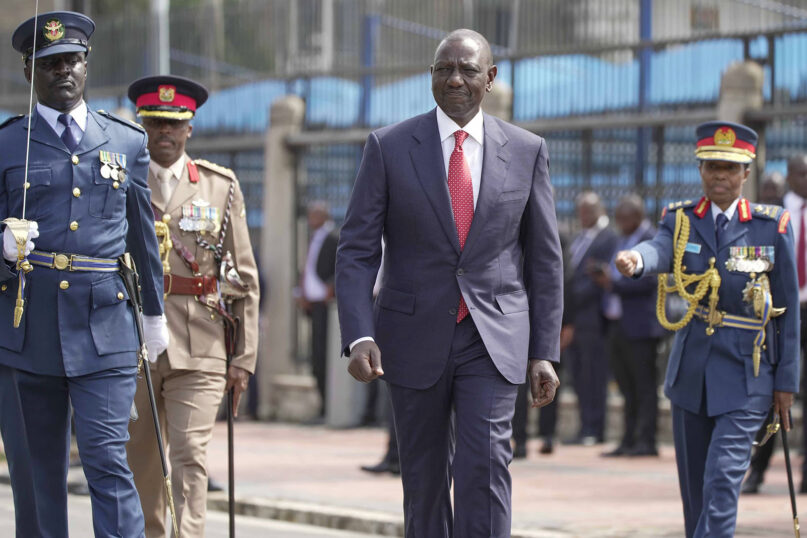NAIROBI, Kenya (RNS) — In a growing split between church leaders and Kenya’s government, two prominent churches have rejected President William Ruto’s personal donations, saying the cash challenges their independence and undermines the public’s view of their integrity.
On Nov. 18, Catholic Archbishop Philip Subira Anyolo of Nairobi ordered the city’s Sts. Joachim and Ann Church to decline 5 million Kenyan shillings ($40,000) that Ruto had offered the previous day. A week later, the Anglican Church turned down a 5 million shilling contribution the president had given to Crispinus Anglican Church in Bungoma.
The refusals of the cash threaten to unravel a historical church-state relationship characterized by such donations. But even as rattled state officials protested, church leaders have cheered, as has the public.
“I think returning the money is good. It is a way of making a statement and teaching the people the right way of giving,” the Rev. Emily Onyango, assistant bishop of Bondo, in western Kenya, told RNS in an interview.
The denominations, which traditionally use the money for church development, mission work and humanitarian activities, say the funds are greatly needed, but according to the Rev. Peter Kinyanjui, a minister of the Presbyterian Church of East Africa, the current government is attempting to capitalize politically on its church giving.
“When someone gives 5 million and announces it in church when there are about 700 people who have slept hungry, then why is he giving it?” said Kinyanjui in his Dec. 8 sermon at Mwiki Presbyterian Church in Nairobi’s Kasarani neighborhood. “We would rather do without it. If he had brought maize flour, we could cook it.”

Kenyan President William Ruto, center, reviews the honor guard after arriving to give the state of the nation address at Parliament in Nairobi, Kenya, Nov. 21, 2024. (AP Photo/Brian Inganga)
But in a statement, Anyolo, the Catholic archbishop, explained that the donations also violated the church’s directives — and the country’s laws — on fundraising. He also highlighted ethical concerns and the need to safeguard the church from being used for political purposes.
Ruto initially gave 2.6 million shillings for the construction of a parish house for Sts. Joachim and Ann, a church in Soweto Slums, in Nairobi’s Embakasi area, and as a gift to the church’s choir. He had promised to deliver the remaining amount, plus a bus for the parish later, only to meet resistance from Anyolo.
Anglican Archbishop Jackson Sapit said the money offer to the Anglican Church in Bungoma was made after the Catholic church’s rejection to test whether the Anglicans would follow suit. “What happened in Bungoma was unfortunate because it was like a display of trying to see what the Anglican Church would do following the recent decision by the Catholics,” Sapit told local Kenya media.
Other Protestant churches have encouraged their congregations to reject contributions by political leaders and their appointees. According to their leaders, most of the money coming from politicians had been stolen from tax revenues.
“We must stop celebrating whenever the president, members of Parliament, governors, members of county assemblies and other political actors donate money whose sources are not clear,” said the Rev. Elias Otieno Agola, chairman of the National Council of Churches of Kenya, at a Dec.3 news conference.
Government officials were giving while at the same time disrespecting human rights and the rule of law, some Protestant leaders have pointed out, saying that human rights defenders in Kenya live in fear of being abducted.
“Lies and falsehood have been elevated to the point where no one knows what to believe anymore,” said Agola, a Presbyterian Church of East Africa minister.
In another issue that has surprised government officials, Kenyan church leaders have united in opposition to a mass vaccination of livestock that the government plans to roll out next month. The government says the vaccinations would prevent disease, boost the animals’ health and make livestock products acceptable in international markets, and it is targeting 22 million cows, 50 million goats and an unspecified number of camels and sheep in the mass inoculation.
But church leaders and some politicians caution that the vaccines could be laced with harmful genetically modified substances, which they say would alter genetic composition of local breeds and affect livelihoods. Kenyans keep the animals for meat, milk and as a source of income.

A farmer looks after his cattle in eastern Kenya. The government plans to vaccinate 22 million cattle, but churches are resisting the mass drive. (Photo by Fredrick Nzwili)
“We also urge you to strongly reject the proposed vaccination of animals being driven by international bodies. Make it clear to your members of Parliament and members of county assemblies that we do not want Kenya to be a surrogate of international bodies. Especially, make it clear that as Kenyans we have rejected genetically modified organisms,” said Agola.
For his part, Ruto has vowed to continue giving, saying the contributions stem from his personal faith and experience. Speaking days after the Catholic Church rejected his donation, the president said he had built 30 churches in 30 years.
As an independent nonprofit, RNS believes everyone should have access to coverage of religion that is fair, thoughtful and inclusive. You can help keep our news and commentary free for all by becoming one of our supporters. And during our end-of-year fundraising campaign, your gift can go further: Starting Nov. 1, your donation will be DOUBLED, dollar for dollar, by a generous gift from our Board of Directors. Please consider chipping in today!
Deborah Caldwell, CEO and Publisher
Discover more from CaveNews Times
Subscribe to get the latest posts sent to your email.























![Exploring the Serene Beauty of Nature: A Reflection on [YouTube video title]](https://cavemangardens.art/storage/2024/04/114803-exploring-the-serene-beauty-of-nature-a-reflection-on-youtube-video-title-360x180.jpg)























